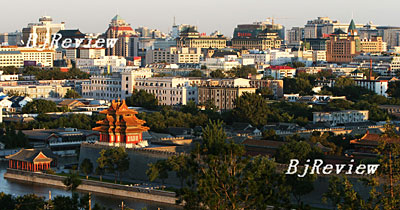
Lust, Caution, the film that won Taiwan-born director Ang Lee the top prize at this year's Venice Film Festival, is adapted from a 1950 short story of the same title by famed Chinese writer Eileen Chang. Arguably the most talented Chinese woman author in the 20th century, Chang wrote in a 1943 novel, "Since foreigners have traveled all the way to see China, we have to show them a bit of China." This sentiment is shared by most Beijing people, who expect to show tourists at next year's Olympic Games "a bit of Beijing."
"Anything that other cities have, Beijing has it too, but Beijing also has things unique to this city," said Yi Zhongtian, a professor of Xiamen University who gained popularity for his lectures retelling Chinese history in an unorthodox tone.
In one of Yi's bestsellers where he compares seven Chinese cities, he writes that Beijing is so simple in a way that people can recognize it at first sight and also so colorful that no vivid language can depict all the wonderful views in the city. Yi writes Beijing has different faces to different people. Some visitors are amazed at the speed the city expands; others are mesmerized by its myriad cultural relics; others admire the academic ambience created by dozens of China's top universities clustered in Beijing; and still others think Beijing stages a never-ending exhibition on the best of Chinese culture and customs.
The characters of Beijing have been shaped by its long history. Fossils of Peking Man, also called Sinanthropus, a human species dating back to 700,000 years ago, were unearthed on the hills of Zhoukoudian, in the southwest suburbs of Beijing. With a history of over 2,000 years, Beijing has been the capital city of several dynasties since 938.
Many Beijing residents regard the imminent Olympic Games as an opportunity for guests from afar to know the true color of the city, fall in love with her and hopefully to live here for a while in the future.
A grandiose city
People on their visit to Beijing are likely to be impressed by the grandness of the city's architecture. Not only the towering skyline that exists in big cities all around the world, Beijing has a lofty air of tolerance unique to a capital city of over 1,000 years.
The Forbidden City, located at the exact center of the ancient city of Beijing, is the world's largest surviving palace complex. The Tiananmen Square to the south of the Forbidden City is the largest city center square in the world. The city's eight-lane highway network manages to make the Beijing's vast size less daunting.
Beijing citizens are proud of their parks, grand in area and decorated with historical relics. For Beijing residents who are used to taking strolls in parks as large as the 160-hectare Fragrance Hills Park and the 291-hectare Summer Palace northwest of downtown Beijing, they find it hard to believe that the 19-hectare Victoria Park is the largest on Hong Kong Island.
Beijing is not only colossal in size but also significant in her multiple roles as the political, military, diplomatic, technological, cultural, educational and sports center of the country. The city has China's largest international airport, Beijing Capital International Airport, and China's largest sports stadium, the 91,000-seat National Stadium dubbed as the Bird's Nest.
"Beijing is also a center of news as international political and economic leaders frequent the city," Yi said.
The prominent position that Beijing has enjoyed for centuries has imbued the city with a feeling of grandness. Guangdong-based Neweekly Magazine once ranked Beijing as the most grandiose city in China.
Grandness is also reflected by the city's inclusiveness and diversity. "Spacious buildings is nothing compared with the space Beijing provides for new cultures," Yi said.

